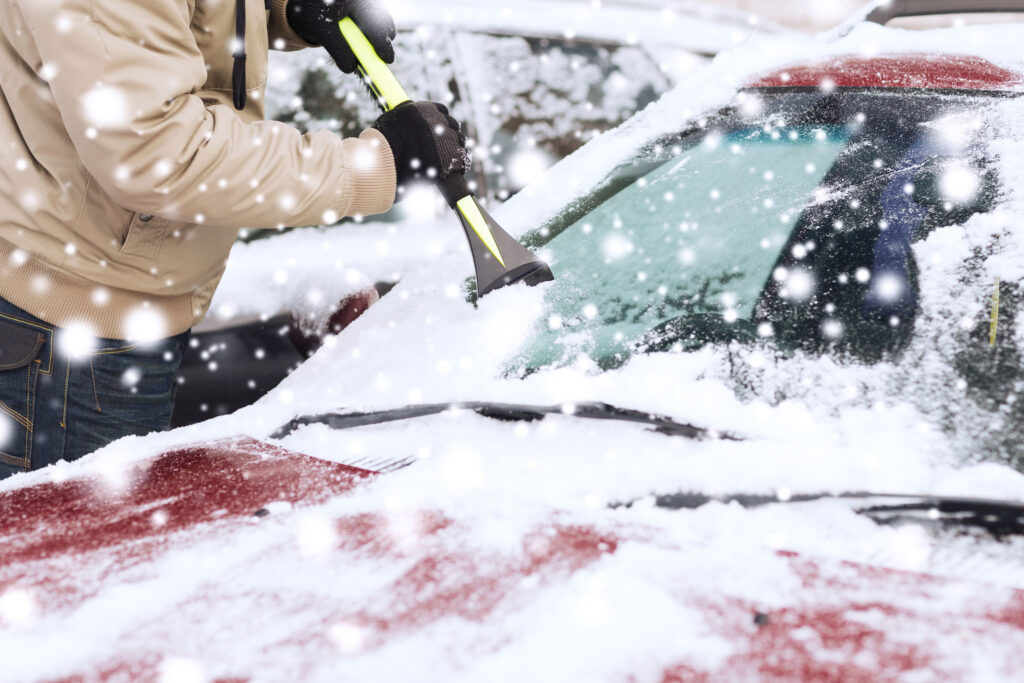5 Tips to Prepare Your Loved One for Winter

Winter can create challenges for many seniors, especially those who live alone or have mobility issues. There are emotional risks, such as isolation from friends and family when we’re stuck at home because of the cold, snow, or ice. But physical risks, like falls on an icy sidewalk or inside the house, can also make your loved one (and you) worry.
The good news: There are a few steps you can take to keep your parent or grandparent warm, safe, and healthy as the weather gets colder. Read on for five tips to prepare your loved one for winter.
1. Keep your loved one’s home safe and warm.
Fireplaces, space heaters, and electric blankets are a great way to warm up during the winter, but they can lead to a fire if left unattended. To help them in case of emergency, replace batteries in your loved one’s carbon monoxide and smoke detectors. It’s also a great idea to place a fire extinguisher near their stove and fireplace.
Next, you’ll want to fall-proof your parent or grandparent’s home as much as possible. Make sure you (or another friend or family member) are available to shovel snow from your loved one’s walkway. You can also check out this blog to learn how to make each room in your senior’s house safer — and how to avoid falls and emergencies.
Older folks are also more likely to get too cold, especially if they have cardiac issues. Make sure your loved one’s home has proper insulation and window caulking to prevent drafts from outside. You should also set their thermostat to at least 68 degrees Fahrenheit; this will help your parent or grandparent avoid hypothermia, freezing pipes, and other issues.
2. Help them stock up on groceries and other essentials.

Getting plenty of fruits, vegetables, and vitamin D-rich foods ahead of time — and keeping extra nonperishables and water in the pantry — will help your loved one keep up a healthy diet, even if they’re snowed in. You should also make sure your parent or grandparent has at least a week’s worth of prescription medications at all times.
Another essential your loved one should have? A senior-friendly cell phone with large buttons and a long-lasting battery. This will not only help them call 911 in case of an emergency; they’ll also be able to keep in touch with family and friends, avoiding the isolation that winter can easily bring.
3. Get proper clothing, and know how to prevent injuries.
Wearing warm clothes and layers when they venture outside can allow your parent or grandparent to prevent hypothermia and frostbite. Help them stock up on hats, thermals, gloves, scarves that cover their mouth and nose, and a winter coat.
You and your loved one should also learn the signs of hypothermia and frostbite — and how to prevent each one:
Hypothermia
This condition happens when the body loses heat too quickly and one’s temperature drops dangerously. Signs of hypothermia include:
- Cold, pale, and ashy skin
- Fatigue and confusion
- Problems with walking or moving around
- Slowed breathing and/or heart rate
To prevent hypothermia, your parent or grandparent should:
- Stay indoors (or limit their time outside).
- Set their thermostat to 68 or higher.
- Dress in warm, dry layers and winter wear.
Frostbite
This condition occurs when extreme cold damages the skin — sometime all the way to the bone. Warning signs of frostbite include:
- White, ashy, or grayish-yellow skin
- Skin that feels hard or waxy
- Numb fingers, toes, cheeks, chin, nose, and/or ears
To prevent or treat frostbite, your loved one should:
- Cover up all parts of their body.
- Head inside if their skin turns red or starts hurting.
- Run the affected area under warm water.
- Call 911 if they have frostbite to prevent loss of limbs.
4. Help them winterize their car, inside and out.

Helping your loved one prepare for winter includes getting their car in good shape, if they can still drive. Whether it’s you or your senior who’ll be driving, make sure there’s gas in the tank and snow scrapers in the back seat. Checking your loved one’s antifreeze, tires, and windshield wipers is also a must before snow and ice hit.
Along with winterizing their car, you’ll want to make sure your parent or grandparent drives with these winter emergency supplies:
- A fully charged cell phone
- A first aid kit
- Blankets
- Extra warm, dry clothes
- A shovel
- Booster cables
- A bag of sand or cat litter (in case their wheels get stuck)
- Water and dried or canned food (with a can opener)
- A flashlight
5. Show your loved one safe indoor home exercises.
Another challenge your parent or grandparent might face during the winter is a lack of exercise. It’s tempting to just curl up in a blanket when it’s so cold and gray outside! But getting active will help your loved one reduce their risk of heart disease, improve their mobility and balance, and promote healthy digestive and immune systems.
Whether your loved one has full mobility, or they’re in a wheelchair, they can try these safe, easy exercises from the warmth and comfort of their own home:
- Wall pushups
- Stretching
- Chair squats and stands
- Arm raises
- Chest presses
- Chair yoga
We hope these tips give you peace of mind while you help your loved one prepare for winter. What’s most important is making sure they (and you) stay safe, healthy, and happy this season.
If you need assistance with meal prep, grocery shopping, medication reminders, or anything else for your loved one this winter, an in-home care professional can help.

Safe-T Home Care is an in-home care agency in Monticello, Indiana. We provide transportation, personal care, and other services so your loved ones can stay safe and independent at home. And our caregivers undergo thorough background checks and training before we pair them with seniors in our community. For more information, visit our website or like us on Facebook.
